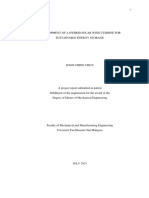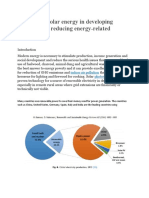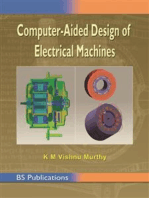Non Conventional Energy Sources
Non Conventional Energy Sources
Uploaded by
sambu112Copyright:
Available Formats
Non Conventional Energy Sources
Non Conventional Energy Sources
Uploaded by
sambu112Copyright
Available Formats
Share this document
Did you find this document useful?
Is this content inappropriate?
Copyright:
Available Formats
Non Conventional Energy Sources
Non Conventional Energy Sources
Uploaded by
sambu112Copyright:
Available Formats
NON CONVENTIONAL ENERGY SOURCES Sub Code : MTP 143 Hrs/Week: 3+1 Total Hrs : 40 IA Marks : 25 Exam Marks
: 100 Exam Hours : 3 Hrs
Module -1 Introduction to Energy Sources : World Energy Features, Indian Energy Scene, Conventional and non-conventional energy sources, Prospects of renewable energy sources. Solar Energy Source: Introduction, Solar constant, radiation on Earths surface, Radiation geometry, Radiation measurements, Radiation data, Average solar radiation, radiation on tilted surfaces, Problems. 8 Hrs Module -2 Solar Energy collectors : Principle of conversion of energy, Flat plate collector, Transmissivity of cover system, Collector energy balance equation, Thermal Analysis of FPC, Useful heat gain, Focusing collectors, advantages and disadvantages, Factors affecting collector performance, Problems. Application of Solar Energy: Solar Water Heating, Heating and Cooling of Buildings, Thermo electric conversion, Power generation, PV cells, Solar distillation, Pumping, Cooking, Hydrogen production. 8 Hrs Module -3 Wind Energy: Principle of energy conversion, Power generation, Forces on blades, energy estimation, Wind data, Components of WECS, Classification of WECS, Advantages and Disadvantages, Types of Wind machines, Performance of Wind machines, Applications of wind energy. Problems Energy from Biomass: Conversion technology, Factors affecting gas generation, classification of biogas plants, Advantages and disadvantages of different types of plants, Problems. 8 Hrs Module -4 Fuel Cells: Design and Principle of operation, Classification, Types, Advantages and disadvantages, Conversion efficiency, Types of electrodes, Work output and EMF of Fuel Cells, Applications of Fuel Cells. Thermo Nuclear Fusion Energy: Fusion Reactions, Requirements, Plasma, Magnetic and Inertial Confinement fusion, Muon Catalyzed Fusion, Characteristics of D-T Reaction, Advantages of Nuclear Fusion, Fusion Hybrid, Cold Fusion. 10 Hrs Module -5 Principles of working: Geothermal, OTEC, Tidal, Waves, and Hydrogen (Generation and Application) 6 Hrs TEXT BOOK: Non conventional energy sources by G.D.Rai Khanna Publishers REFERENCE BOOKS: 1. Solar Energy by S.P.Sukhatme, Tata McGraw-Hill Publishing Co. Ltd. 2. Solar Energy by G.D.Rai Khanna Publishers 3. Fundamentals of Renewable Energy Systems by D. Mukherjee and S. Chakrabarti, New Age International Publishers. 4. Non Conventional Energy Resources by D.S. Chauhan and S.K.Srivastava, New Age International Publishers. SCHEME OF EXAMINATION Students are asked to answer any five questions. (1) Question No. 1 is Compulsory, (2) Answer any 4 full questions
from question No.2 to question No. 6.
You might also like
- Design Analysis and Comparative Study of Hub Motor For An Electric BikeDocument7 pagesDesign Analysis and Comparative Study of Hub Motor For An Electric Biketarib MunaibNo ratings yet
- Water and Slurry HammerDocument48 pagesWater and Slurry Hammeralvarezjgo100% (2)
- Elect3 2Document2 pagesElect3 2pranav10dulkarNo ratings yet
- Introduction To Non Conventional Energy SystemsDocument234 pagesIntroduction To Non Conventional Energy SystemsCarib100% (1)
- Non-Conventional Energy Sources: PEME5308 (3-0-0)Document1 pageNon-Conventional Energy Sources: PEME5308 (3-0-0)SVL CONSTRUCTION EQUIPMENTSNo ratings yet
- Svs College of Engineering: Name of The Faculty: S.KalaiarasiDocument23 pagesSvs College of Engineering: Name of The Faculty: S.KalaiarasiSudharsana ANo ratings yet
- Non Conventional Energy SourcesDocument14 pagesNon Conventional Energy Sourcesk rajendraNo ratings yet
- Solar Photovoltaics: Fundamentals, Technology and ApplicationsDocument1 pageSolar Photovoltaics: Fundamentals, Technology and ApplicationspksahunitrklNo ratings yet
- 22ETC15E - Renewable Energy Sources - Module-1 NotesDocument9 pages22ETC15E - Renewable Energy Sources - Module-1 NotesMr SpamNo ratings yet
- Syllabus For This Chapter: Cedt NPTEL-NCE-01-SyllabusDocument53 pagesSyllabus For This Chapter: Cedt NPTEL-NCE-01-SyllabusJoseph Sajan100% (1)
- Optimum Design of Wind-Diesel Hybrid System For Re PDFDocument9 pagesOptimum Design of Wind-Diesel Hybrid System For Re PDFAishraNo ratings yet
- Uniti-: Oro551-Renewable Energy Sources Question Bank Principles of Solar RadiationDocument7 pagesUniti-: Oro551-Renewable Energy Sources Question Bank Principles of Solar RadiationAnand BNo ratings yet
- Concentrating Power Technologies: SolarDocument23 pagesConcentrating Power Technologies: Solar2K19/ME/140 MOHAMMAD ANASNo ratings yet
- Conventional Power Plants SyllabusDocument2 pagesConventional Power Plants SyllabusPardeep100% (1)
- Renewable Energy - Solar Electrical Energy SystemsDocument76 pagesRenewable Energy - Solar Electrical Energy SystemsGhenoiu PaulNo ratings yet
- Solar Panel Automated Cleaning Using Water Re-Capture and Re-Circulation SystemDocument11 pagesSolar Panel Automated Cleaning Using Water Re-Capture and Re-Circulation SystemIJRASETPublicationsNo ratings yet
- Photovoltaic SystemsDocument32 pagesPhotovoltaic SystemsSabri BouloumaNo ratings yet
- Gujarat Technological University: Semester - II Subject Name: Wind and Small Hydro Energy SystemDocument2 pagesGujarat Technological University: Semester - II Subject Name: Wind and Small Hydro Energy SystemfalakNo ratings yet
- A - Seminar - Report - On - SOLAR - POWER - SYSTEM - D (1) - 1Document37 pagesA - Seminar - Report - On - SOLAR - POWER - SYSTEM - D (1) - 1lone playerNo ratings yet
- 5 Solar Themal CollectorDocument77 pages5 Solar Themal Collectorkaramn3matNo ratings yet
- A Project Report On: Single Axis Solar TrackerDocument47 pagesA Project Report On: Single Axis Solar TrackerzizoNo ratings yet
- Solar Thermal Power PlantDocument32 pagesSolar Thermal Power Plantvigneshgemini100% (1)
- Recent Progress of Magnetic Field Application in Lithium Based BatteriesDocument19 pagesRecent Progress of Magnetic Field Application in Lithium Based BatteriesKiki Rezki LestariNo ratings yet
- Nuclear Power - A Future Prospective: Presented byDocument17 pagesNuclear Power - A Future Prospective: Presented byDev Kumar100% (1)
- Module7 PDFDocument76 pagesModule7 PDFMuhammad AgungNo ratings yet
- Important Questions Unit Wise - EE3303 ELECTRICAL MACHINES - IDocument2 pagesImportant Questions Unit Wise - EE3303 ELECTRICAL MACHINES - Idhanushkevin04No ratings yet
- 50.solar Tracking System For Optimal Power GenerationDocument4 pages50.solar Tracking System For Optimal Power GenerationRavi Teja Varma KunaparajuNo ratings yet
- Microhydro Power PlantDocument15 pagesMicrohydro Power Plantjeevana manjunathNo ratings yet
- Gujarat Technological University: W.E.F. AY 2018-19Document3 pagesGujarat Technological University: W.E.F. AY 2018-19manish_iitrNo ratings yet
- An Introduction PPT: Renewable Energy Technologies in Power GenerationDocument20 pagesAn Introduction PPT: Renewable Energy Technologies in Power GenerationSpark Network100% (1)
- Chapter 1-Literature Survey 1.1Document41 pagesChapter 1-Literature Survey 1.1Abdul WaliNo ratings yet
- MGMTDocument631 pagesMGMTSk RainaNo ratings yet
- RENEWABLE ENERGY RESOURCES Question Paper 21 22Document3 pagesRENEWABLE ENERGY RESOURCES Question Paper 21 22Pikachu Pandey100% (1)
- Utilisation of Electrical Energy - 9087Document7 pagesUtilisation of Electrical Energy - 9087Nilesh MahajanNo ratings yet
- Solar EnergyDocument30 pagesSolar EnergyJatin Sharma cse 20No ratings yet
- Application of Solar EnergyDocument202 pagesApplication of Solar EnergyAbdou BouzianeNo ratings yet
- Flywheel Energy StorageDocument2 pagesFlywheel Energy StorageprasadsollapurNo ratings yet
- Flywheel AtzDocument5 pagesFlywheel AtzRakesh Bhaktha RNo ratings yet
- A Presentation ON Solar Wind Hybrid SystemDocument21 pagesA Presentation ON Solar Wind Hybrid SystempriyaNo ratings yet
- Smart Power ManagementDocument21 pagesSmart Power ManagementengrarNo ratings yet
- 4Document14 pages4Deepika Chauhan100% (1)
- Soon Ching ChunDocument45 pagesSoon Ching ChunDivyabharathi Janakiraman100% (1)
- Chapter 2 Solar SystemDocument8 pagesChapter 2 Solar SystemavocadocolorNo ratings yet
- A Review On Monitoring Solar System Parameters Using IoTDocument4 pagesA Review On Monitoring Solar System Parameters Using IoTIJRASETPublicationsNo ratings yet
- Under Water WindmillDocument23 pagesUnder Water Windmillapi-343773957100% (2)
- EV Aug 2020Document15 pagesEV Aug 2020Akansha SnehaNo ratings yet
- Potential of Solar Energy in Developing Countries For Reducing EnergyDocument3 pagesPotential of Solar Energy in Developing Countries For Reducing EnergyPrashannaNo ratings yet
- Dr. P. S. Kulkarni: Energy From Tides and WavesDocument56 pagesDr. P. S. Kulkarni: Energy From Tides and WavesSowjanya Bhamidipati100% (1)
- Development of Solar and Wind Hybrid TreeDocument13 pagesDevelopment of Solar and Wind Hybrid TreePATEL KRUNALNo ratings yet
- MechDocument7 pagesMechPradeep KumarNo ratings yet
- Design and Development of Hybrid Solar Dryer For Domestic ApplicationsDocument151 pagesDesign and Development of Hybrid Solar Dryer For Domestic Applicationssangeet khule100% (1)
- Small and Hybrid Wind TurbinesDocument23 pagesSmall and Hybrid Wind Turbinesk rajendraNo ratings yet
- Solar Chimney Power PlantDocument24 pagesSolar Chimney Power PlantAkhil GeorgeNo ratings yet
- Ee8703 - Res - Unit 3Document55 pagesEe8703 - Res - Unit 3mokkai of the day videos100% (1)
- U.S. Renewable Energy Factsheet CSS03-12 E2018Document2 pagesU.S. Renewable Energy Factsheet CSS03-12 E2018Jose MartinezNo ratings yet
- Seminar PPT On Solar Updraft TowerDocument23 pagesSeminar PPT On Solar Updraft TowerM Sajid Chry100% (7)
- Design of Mini Compressorless Solar Powered Refrigerator: Project Report ONDocument40 pagesDesign of Mini Compressorless Solar Powered Refrigerator: Project Report ONMir AamirNo ratings yet
- Non Conventional Energy Sources PDFDocument1 pageNon Conventional Energy Sources PDFAditya MoreNo ratings yet
- Non Conventional Energy Sources PDFDocument1 pageNon Conventional Energy Sources PDFPRE-GAMERS INC.No ratings yet
- Non Conventional Energy Sources PDFDocument1 pageNon Conventional Energy Sources PDFKartheek Kolla0% (1)
- PWHTDocument79 pagesPWHTnguyenNo ratings yet
- JT BakerDocument8 pagesJT Bakerimma67No ratings yet
- Green ChemistryDocument27 pagesGreen ChemistryMonika11Sharma100% (1)
- 1392149762keystone Reliance Reference Guide Feb 2014Document9 pages1392149762keystone Reliance Reference Guide Feb 2014Thiago BerthaudNo ratings yet
- Eddy Current Exam Questions and AnswersDocument99 pagesEddy Current Exam Questions and AnswersColin-James Lowe71% (7)
- CHAPTER 1 - SKT3013 - Update Notes 2Document67 pagesCHAPTER 1 - SKT3013 - Update Notes 2NURUL ZAKIRAH BINTI BORHANUDINNo ratings yet
- Simple Test Methods For Meat ProductsDocument16 pagesSimple Test Methods For Meat Productsbile86No ratings yet
- Hola de 2015Document9 pagesHola de 2015XYZUSPNo ratings yet
- Giant Tube WormsDocument7 pagesGiant Tube WormsChipotle ObsessedNo ratings yet
- Example 3p10 Incropera 6th Edition 2007Document3 pagesExample 3p10 Incropera 6th Edition 2007minhazul islamNo ratings yet
- Laboratory Activity 3 - Group 10Document6 pagesLaboratory Activity 3 - Group 10Reinier FrancoNo ratings yet
- Soal Fisika AnswerDocument3 pagesSoal Fisika AnswerHimawan EkaNo ratings yet
- Liquid Safety datasheet772-SLAAH502A-KR-GDocument7 pagesLiquid Safety datasheet772-SLAAH502A-KR-GRajender GandhiNo ratings yet
- Rios2013 - Chemical Constituents From Flourensia ResinosaDocument3 pagesRios2013 - Chemical Constituents From Flourensia ResinosaanascopelNo ratings yet
- Powder MetallurgyDocument6 pagesPowder Metallurgyjayadevakodi100% (1)
- APH Lube Oil Flushing - RajeevDocument4 pagesAPH Lube Oil Flushing - Rajeevvishal_vajatNo ratings yet
- Chemistry - Chapter 9 Study GuideDocument4 pagesChemistry - Chapter 9 Study GuideJohnHanaNo ratings yet
- Perhitungan Teknis CCSP W450 BDocument4 pagesPerhitungan Teknis CCSP W450 BAhmad Untung100% (2)
- Meo CL 2 Ekg QusetionsDocument17 pagesMeo CL 2 Ekg QusetionsAurvin SinghNo ratings yet
- Is - 01897 - 2008Document9 pagesIs - 01897 - 2008Sangita GhaisasNo ratings yet
- Ped Cheat CodeDocument13 pagesPed Cheat CodeAtharva PanchwaghNo ratings yet
- Roy-Mandal2020 Article Thermo-economicAnalysisAndMultDocument15 pagesRoy-Mandal2020 Article Thermo-economicAnalysisAndMultAhmed RagabNo ratings yet
- Abaque: Peristaltic Hose Pumps - Product BrochureDocument8 pagesAbaque: Peristaltic Hose Pumps - Product Brochurejunior ventura condoNo ratings yet
- Ocean Victory - Lo Analysis Report July 23Document15 pagesOcean Victory - Lo Analysis Report July 23swaroopNo ratings yet
- GenesisG 4 RRLDocument13 pagesGenesisG 4 RRLMaribel Tan-Losloso NayadNo ratings yet
- Res Eng CH 3Document16 pagesRes Eng CH 3weldsvNo ratings yet
- Post Galvanising DefectsDocument3 pagesPost Galvanising DefectsmshahidshaukatNo ratings yet
- Rolform 2-57Document28 pagesRolform 2-57Cw TanNo ratings yet
- AP 5069 L04 DiffusionAndOsmosisDocument10 pagesAP 5069 L04 DiffusionAndOsmosisChinyere Igwe0% (1)

























































































